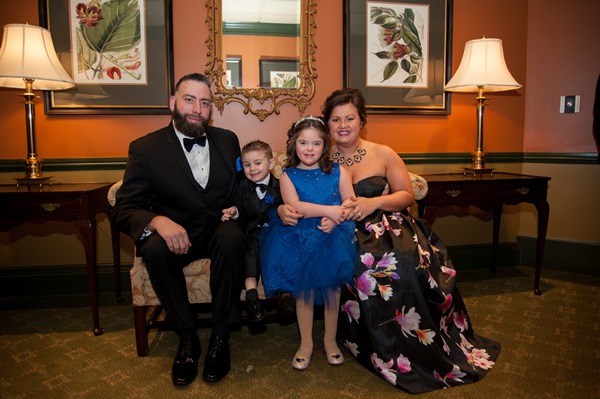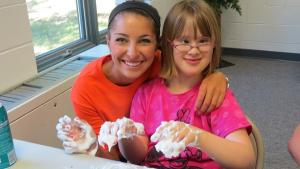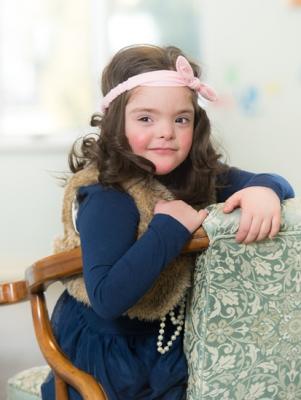Ambassadors
A grateful Schreiber says thank you to the community
September 21, 2018In July, when we kicked off another season of selling tickets for this year’s 30th Annual Rubber Duckie Race & Festival, we did so with some anxiety.

The event, our largest community fundraiser, had suffered a significant blow as the result of the loss of one of the key supporters of the race over the years.
Fundraising is critical to our operation. The loss of support could potentially have hurt our ability to provide services.
So we asked for your help. And as you always have done for Schreiber, throughout the 82 years we’ve been in Lancaster County, you came through. Thanks to you, we were able to reach our budget goal for Duckie: We netted more than $115,000.
We are grateful for the many volunteers who came into our office and said, “I’ll sell some Duckies for you.”
We are grateful for the many sponsors who stepped up with their support. And we would particularly like to thank Donegal Insurance Group for being our presenting sponsor.
Most of all, we are grateful for you, the thousands of people who bought tickets. You stopped by our table at Root’s or on Lancaster’s square outside of Central Market. You picked up some tickets from the persistent friend or relative who was selling. Or you came into the Center to buy, sometimes with a story about the child you know that we helped or the time you bought your first Duckie in 1998.
Some of you even came out to Duckie Day on Sept. 9, when it rained all day and our Festival amounted to a couple of picnic tables and some games under one of the pavilions.
Because of that, we asked — again — for help, this time to make up for the lost revenue caused by the weather. We normally raise $10,000 the day of the race through the sale of tickets, T-shirts and games. You have donated that much and more through after-the-event gifts.
Much of it came from Orrstown Bank, which had already provided a sponsorship, sold tickets at their branches and showed up on the rainy Duckie Day to do whatever we asked. The bank delivered this week an additional $15,000 donation.
We are grateful for all of it, but we’re already moving on to the next thing. The Extraordinary Give is coming up Nov. 16, and we will have some big news — some really big news — to tell you about as we get closer to that.
Until then, thank you, Lancaster County. With your support of Schreiber, you continue to improve the lives of all the children who need our services, every day.
Meet the Grassos, a second generation Schreiber family
July 11, 2018Starting services at Schreiber for two of her children did not create anxiety for Andrea Grasso. She had seen what Schreiber did for two of her sisters.

Andrea’s sister Ashley was born with Prader-Willi Syndrome, a rare genetic condition that creates a host of physical and developmental challenges.
“We came to Schreiber almost every day of the week for her preschool and her therapy services,” Andrea said. “It was just something I grew up with. (Schreiber is) something that’s been part of my family since she was born.”
Then her parents adopted Ariel, a little girl who had Down Syndrome. And the visits to Schreiber continued.
Fast forward a few years. Andrea met and married Nick Grasso. Nick was an only child, but that didn’t make it harder to blend in with his new family. It might have made it easier.
“Both of my sisters just love Nick,” Andrea said. “They just gravitated toward him, and he would embrace them with open arms.”
When it was time for Andrea and Nick to start a family, they were both open to children with special needs. For Andrea, it was a natural continuation of the relationships she built with her sisters as a child. For Nick, he saw they had the experiences and the resources that few adopting parents could offer.
So they adopted Mia and Giuliana, and Giuliana has Do

wn Syndrome, just like Andrea’s sister Ariel. And they have two biological sons, Paxton and Jude.
Of the four, it was Paxton’s start in life that proved to be the scariest. They had taken him home from the hospital, but at 10 days something appeared to be wrong. He was crying and fussy and not wanting to eat. At the pediatrician’s office, the doctor saw Paxton have a seizure and sent them right to Lancaster General Hospital.
The medical team there came back with the kind of news that would be any new parent’s worst nightmare.
“The doctor came in and said, ‘He has a Level 3 brain hemorrhage. We need to get him to Hershey. LifeLine will be here in 7 minutes. And you need to get to Hershey as soon as you can.'”
Andrea remembers little of what happened on the trip to Penn State’s Milton S. Hershey Medical Center.
“I know it was a whirlwind of doctors. And I remember pleading, ‘Can I please go with him? Can I please go with him?’ And they said no. And from that point on it was just a blur. We got to Hershey, and he had already been there for 15 or 20 minutes. They had him settled in a room. And he had tubes, and he was just very sick. It was terrifying. As a new mom, you have two young children at home already, and then you have this new baby, and he’s sick and you don’t know why. And you don’t know what caused it. You don’t know what happened. It’s just absolutely terrifying.”

Paxton’s stay in the hospital lasted a month and a half. While he was there, doctors placed a shunt in his brain that connects to a small tube that runs down into his abdomen. The shunt keeps any fluid from building up in his brain again.
He’s a healthy, happy little guy now. But that early bit of brain trauma left him with some sensory issues, which, in turn, create some behavior issues. He attends Schreiber’s S.T.A.R.S. Preschool and has received occupational therapy for a little more than a year.
“He was a different kid when he (first) came in,” Andrea said. “He was shy and very cautious and anxious and nervous. The progress we’ve seen, even over the last six months, is incredible. He is now so much more calm and so much more relaxed. He’s learning how to regulate himself and how to regulate his emotions. He’s learning how to deal with different sensory issues. He’s learning those coping skills.”
The progress with Giuliana has been equally remarkable.
“When we first fostered her, she was a little less than a year old,” Andrea said. “At that point, she couldn’t hold her head up, she couldn’t roll over. She couldn’t do anything. She was already delayed because of the Down Syndrome, but she was also very much delayed because of neglect.”

And now, after five years of therapy first through Lancaster County Early Intervention and then at Schreiber, she can do so much more.
“She came (to Schreiber) being not being able to say two words together,” Andrea said. “Now, she’s able to say, ‘I want this,’ or ‘I need that.’ She can say sentences. That’s huge.”
Andrea knows more than most what a difference Schreiber can make in a child’s life. She saw it with her sisters. She’s seeing it now with her son and daughter. For many families, this is one of the few places, maybe even the last place, where they can have hope. Hope that a son will live a full life free of anxiety, or a daughter will learn to talk.
“Families with children with disabilities, they hang onto (Schreiber),” she said. “People from the outside need to see what happens here. They need to see how remarkable this place is and the incredible things that come out of here.”
Anthony Melendez’s new look
May 5, 2017Since then, Anthony has yearly follow-up appointments with Dr. Scott Bartlett and a team of cranio-facial specialists at CHOP to monitor his progress. Jen said Dr. Bartlett had told her that Anthony might be able to undergo a procedure to improve the appearance of the area where his ear was missing.
She wasn’t in a big hurry to do the surgery, mainly because it wasn’t something she thought needed to be “fixed.”
The CHOP doctors are one of the few places in the country trained in MEDPOR ear reconstruction, a procedure developed by a Beverly Hills plastic surgeon that uses a plastic implant attached using the patient’s own tissue.
For Anthony, doctors would mold the implant from his fully formed ear, take some tissue from his scalp that would serve as a kind of living glue and stitch the implant into this tissue and onto the side of his head. Then they would take some additional skin from his groin and stitch that over the implant to make it look more like a real ear.
Jen went ahead with the procedure for Anthony on Nov. 21. The surgery took seven hours, and he was in the hospital for two days, leaving in time to be home for Thanksgiving.
Two weeks later, the protective mold came off and she was able to see his new ear for the first time.
“Even though they try to prepare you for everything involved, it doesn’t completely prepare you,” Jen said. “I was expecting to see a perfectly formed ear, but it was swollen and bruised. It didn’t look like an ear at that point.”
There were a couple of setbacks requiring two additional surgeries – one in December and another in February.
“He’ll grow into it,” Jen said.
Still, it’s been a stressful time.
“Living through it and watching him go through it, it takes a toll on me,” Jen said. “There were times I thought the implant was failing. I was doubting myself.”
During a recent physical therapy session, Anthony was more than willing to stop for some pictures. He was still the same bouncy little boy. The process doesn’t seem to have changed him, even if he understands that he is changed.
“At one point, we finally talked about it,” Jen said. “I said, ‘That’s your ear.’ And he said, ‘That’s my ear? For me?’ And I said, ‘For you.'”
She turned back to watch as Anthony continued with his therapy session, taking one more step on the long journey to realizing his fullest potential.
***
If Anthony’s story moves you, visit our donation page and consider a small recurring contribution. Your monthly or quarterly gift will make a difference in the lives of Anthony and the thousands of kids we see throughout the year.
Justin Walker returns to Camp Schreiber — for his job
July 13, 2016He received therapy, attended preschool (and worked with Jay Graver, Mr. Jay, the current preschool and camp director) and spent many summers at Church of the Apostles for camp.
“So many memories coming in here,” Justin said, looking around the church’s gym. “It’s so big, and we had so much fun. It was a great way to socialize and make friends. I still have friends that I made here at camp and preschool.”
Justin returned as part of his job. He’s an administrative officer at the Pennsylvania Human Relations Commission. The main part of his work involves going to schools, libraries, camps and other children’s groups to read “The Fair Housing Five,” a kids book about fair housing agencies.
“My experience at Schreiber taught me: There are no limits,” Justin said. “Schreiber was always very encouraging. The message was: You can do whatever you think you can do, you just do it differently. It was never about what you can’t do. Always what you can do.”
Sophia Clay thrives at Schreiber
June 21, 2016Sophia has cerebral palsy and struggles to control her body movements. Gaining muscle strength and control is important for her, as this will help her stand and walk. Because it is hard work, physical therapy is Sophia’s least favorite activity. The therapist has started working on relaxing techniques that will also help with movement control. Sophia’s mother helps her exercise and stretch during the therapy sessions.
“I’m right there with her,” Kelly says. “The best way for parents to help their kids is to be involved here. Therapy is only once a week, so you have to work on these things at home if your child is going to progress. Each month I come away learning something new.”
Kelly knows that with constant work Sophia will gain greater mobility and the skills necessary to live a better life. Sophia is able to move her own wheelchair to get around and has positive interaction with her peers at school. As she learns to better control her movement and speech it will improve her ability to communicate and interact with those around her.
Sophia’s condition requires more than one type of therapy. At Schreiber, Sophia is able to work on her gross and fine motor skills, develop her speech articulation, and learn important social skills.
During speech therapy, Kelly watches Sophia through an observer’s window.
“She’s come a long way with her speech.” Kelly says. “I learned different ways to help her make sounds that she has trouble pronouncing from watching the therapist work with her here.”
Kelly plans to enroll Sophia in Schreiber’s summer camp program and looks forward to meeting other families that may have children who will become playmates for her daughter. One way she hopes to develop relationships is through a newly formed parent support group. The group, which plans to meet monthly, was formed by parents who want to network, encourage and connect with other families experiencing similar challenges.
“I’m glad we’re at Schreiber because there aren’t a lot of places that offer this kind of support,” Kelly says. “Everything she needs is right here. And all the therapists show concern for Sophia and for us as a family.”
Meet the 2016 Ambassadors: Sophia Panzini
March 4, 2016Sophia Panzini
Age: born 3/21/97 (18, turning 19 in March)
Diagnosis: Autism spectrum disorder
Parents: Reenie and Peter Panzini, Manheim Township
Siblings: Edward, 20; Carina, 10
Favorite activities: Listening to music, adult coloring books, playing games on the Wii, collecting jewelry
What she watches and listens to: The Food Network, “Spider Man” movie, Destiny’s Child
Favorite food: “Mac and cheese – gluten-free, please!”
When she grows up she want to: “Be a Hollywood singer.”
Three words to describe her: Beautiful, sweet and funny
What else to know about Sophia: She attends Schreiber’s Club 625 events, making friends and being a teenager.
Like a lot of kids with autism, Sophia Panzini is reluctant to look people in the eye when she talks to them. But when she’s posing for a picture, she loves the camera — and the camera loves her.
Here’s her story, in the words of her mom Reenie.
“Sophia was diagnosed with autism when she was 8, and we had just moved to Lancaster from New York City. Her pediatrician told us about Schreiber, and we practically ran there! We didn’t know anything about therapy or autism, and we were literally walked slowly through everything step by step. Sophia learned to have conversations, hold writing instruments, walk up and down stairs without crying, and so much more. We (as a family) learned that we’re stronger than we thought, and that you can get through anything with enough love and a lot of humor.”
Meet the 2016 Ambassadors: Ty McCabe
March 2, 2016Tiberius “Ty” McCabe
Age: He turned 6 in December
Diagnoses: Pierre Robin Syndrome, Pterygium Syndrome, hearing impaired, speech and language impaired
Grade and school: Schreiber S.T.A.R.S. Preschool
Parents: Kevin and Margaret McCabe, Lititz
Siblings: Delaney, 12
Favorite activities: Playing with Delaney; playing with trains, tractors and monster truck toys; playing ABC Mouse and tabletop games with the nurses; video games
Favorite food: Pudding
What he watches and listens to: On TV, he likes “Magic School Bus,” Mr. Rogers, and SpongeBob; for movies, he likes the “Air Bud” series; favorite song is “The Wheels on the Bus”
When he grows up he wants to: Be a pilot or drive monster trucks
Three words to describe him: Outgoing, determined and happy
For the Ambassador photo shoot, Ty McCabe came prepared. He rocked the white hat and black bow tie. When it was his turn, he plopped down in the comfy chair and faced the camera, his whole demeanor saying: “I’m ready. Let’s do this.”
That’s Ty: spreading smiles and good vibes whenever he comes to Schreiber. Which, as it turns out, is a lot. He’s here for preschool, and he receives physical, speech and occupational therapy.
He was born with a couple of different conditions: Pierre Robin Syndrome, which left him with a smaller-than-normal lower jaw, issues with his tongue and feeding problems; Pterygium Syndrome, which carries several symptoms but primarily affects his joints and bones; and he has hearing, speech and language impairments.
During therapy and at home, he works on stair climbing, bike riding and dressing himself. He practices fine motor skills like writing, using scissors and feeding himself. He’s trying to improve his speech and his signing skills. Since he started at Schreiber, he has learned to walk without a walker, is able to form some words and is eating Stage II foods, the thicker, chunkier foods that replace purees.
“(He is preparing) for mainstream education at the highest functional level of independence,” his mom Margaret says. “We have seen academic improvement despite many hospitalizations, surgeries and medical appointments.”
Meet the 2016 Ambassadors: Graham Lodwick
March 1, 2016Graham Lodwick
Age: He turns 12 in August
Diagnosis: Deaf and childhood speech apraxia
Grade and school: Fifth grade, John Beck Elementary School
Parents: Wendy Williams and Karl Lodwick of South Lebanon Township, Lebanon County
Siblings: Graham has an older brother Reese, 14
Favorite activities: Playing with pets, playing video games, bowling and riding his bike
Favorite food: Pizza
What he watches and listens to: “Drake and Josh,” “Minions,” the song “The Best Day of My Life” by American Authors
When he grows up, he wants to: Be a car designer
Three words to describe him: Happy, silly and loving
Graham has been coming to Schreiber for speech therapy since he was 6. Dorlas Riley, Schreiber’s lead speech therapist, diagnosed Graham with speech apraxia. The condition is defined this way by the American Speech-Language-Hearing Association: Graham knows what he wants to say, but his brain has difficulty coordinating the muscle movements necessary to say those words. He’s also deaf and has a cochlear implant.
So in his twice-a-week therapy at Schreiber, he practices his speech sounds and works on listening to get the best use of his cochlear processor. He’s also working on talking in complete sentences. The work is paying off. When he started with Dorlas, he communicated entirely by signing.
“(Now), he can carrry on a conversation with someone who does not use sign langugage,” says his mom Wendy.
It takes a lot of effort to make that kind of progress. But his therapy with Dorlas doesn’t seem like work.
“He loves it,” Wendy says. “Even after six years, he still looks forward to coming.”
Meet the 2016 Ambassadors: Sophia Clay
February 29, 2016Sophia Clay
Age: She turns 5 on March 28
Diagnosis: Cerebral palsy
Parents: Kelly and Adam Clay of Manheim Township
Siblings: None
Favorite activities: Playing with her toys, going to the beach, watching movies on her iPad, riding her bike around the neighborhood and seeing plays at local theaters.
Favorite foods: Pizza and ice cream
What she watches and listens to: Disney movies, “Doc McStuffins,” “Sofia the First,” princess movies
Three words to describe her: Happy, outgoing and determined
What else to know about Sophia: She has a black lab named Dallas.
***
Sophia Clay and her mother, Kelly, attended a Schreiber board meeting late in 2015, and Sophia charmed the room with her smile and her spirit. Sophia’s cerebral palsy means she uses a wheel chair for a lot of her day. Her therapy at Schreiber is intended to help her be out of the chair more. “She’s working to become stronger in all areas of her life,” Kelly says. “She practices with a gait trainer so she can stand on her own. She works on sitting up without assistance. She practices her fine motor skill, her articulation and eating on her own.”
It’s the articulation — how clearly she speaks — where Sophia has shown the biggest progress, her mom says.
“Sophia’s language has come a long way,” Kelly says. “When she started, she could only say a few things. Now, she can say 10-word sentences.”
And that’s just the beginning. With her determination, she will be ready to make speeches in her class when she starts school.
An aspiring actor with Down syndrome
March 11, 2015
Inside one of the Fulton’s classrooms, Alex is one of a half-dozen or so kids seated around a circle on small carpet squares. Teacher Amy Kaye Mullen runs the kids through a series of acting exercises.
When it’s time to be a fish or an alligator, he jumps right in. When it’s his turn in a role-playing exercise, he grasps the idea and gives it his best shot. No big deal.
This is what he wants to do, Lisa says.
“He doesn’t really play with toys much,” she says. “He’s very imaginative and does a lot of acting in his play. We’ll watch a movie, and he’ll say the lines and act it out right along with the movie.”
She saw the Fulton was offering acting classes, so she called Jennifer Ridgway, the Fulton’s director of community engagement. Lisa told her about Alex, and Jennifer said to come in for a meeting.
“We took him in, and it was like a little audition,” she says. “(She tells Alex), ‘Can you be a fish.’ So he did a couple fish things” — and Lisa points her hands in front of her to mimic swimming — “and she says, ‘See you next Saturday.'”
Having kids like Alex in the Fulton’s acting classes is part of the theater’s effort to provide inclusive experiences for the community, Ridgway says. It’s the same thinking that prompted the Fulton to partner with Schreiber in offering sensory-friendly programming.
In the past year, it added Sugey Cruz-Everts from the Tommy Foundation to its Community Engagement Advisory Board. The Tommy Foundation is a nonprofit that provides support for families with an autistic child.
That could lead to new programs to serve the autism community, Ridgway says.
For the Johannings, an acting class is more than just a fun activity for Saturday mornings. They drop off and leave, which they had never done before (Mom was a little nervous). And maybe more importantly, the classes support their strategies to continue his social and emotional development.
“He learns to follow the rules of the session: We greet our friends; we listen to the teacher; we follow directions,” she says.
Like a lot of parents of children with special needs, Lisa worries about how he would make friends and whether kids would be mean.
For her, having Alex in acting classes with typical kids and mainstreaming him in public school have helped break down the obstacles that might otherwise have existed in his efforts to socialize.
“When we were in school, kids like Alex were in special ed,” she says. “We didn’t see them. (Alex) is making friends here and in school. He’s growing up with them. He’s just one of the kids.”
Feeling like he’s just one of the kids will make a huge difference as he grows into adulthood and starts chasing that acting dream.
And that is a big deal.